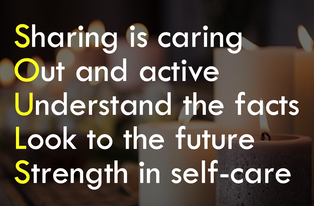 As the government reintroduces it’s work-from-home guidance, many are feeling their sense of normality slowly slipping, reversing back to the groundhog days of 2020. Discussions of reverberating rules and restrictions echoing back and forth can lead one to feel exhaustion, fatigue and anxiety of the future. Recent research has found that although adherence to measures remains high, people are suffering with the seemingly backwards step so close to the festive holidays. This feeling of tiredness and exhaustion is termed “Pandemic Fatigue” or “Restriction Fatigue”, simply put - it’s at the point where short term measures and behaviour adaptations to the pandemic become longer term and longer lasting, without an end point in site. When the goal posts are moved and moved, the sprint becomes a marathon and the adherence to measures becomes more of longer lasting behaviour change, seeping in to our new sense of normality. Sharing is Caring With the broken record of covid still on repeat, it may feel difficult to talk about how you are feeling. It is so important however to not feel alone in your thoughts, and share your concerns and expectations, your worries and your fears with those around you. A problem shared is a problem halved is so true in this instance. At some point, others would have been through the same emotions, even going through it at this moment and the ability to talk to someone is so beneficial. Whether it be in person (if restrictions allow) or on the phone, a message or a zoom can really help you share how you are feeling. Chances are, others are going through the same thing and would be grateful of someone to confide in. Out and active Even with the newest rules in place regarding vaccine passports in certain establishments, at present everyone is still able to get out in the wintery fresh air and get their body moving. Much research highlights exercise as a benefit to society, releasing endorphins and helping to support a better mood and sense of wellbeing. Social exercise, such as a walk with friends, or a socially distanced class at the gym all supports a persons positive sense of health and wellbeing. Understand the Facts As well as the unprecedented pandemic, we are also battling an infodemic between fact and fiction. The vast amount of information from numerous unregulated sources regarding messages and misconceptions, makes it a challenge to portray research based information from the correct avenues and sources. Social media can be a benefit to spread good news, connect with others and perfect our tiktoks, but it can also create worry, anxiety and fear in the spreading of fake news and theories. Understanding the fact from the fiction, the scientifically backed data, and the peer reviewed published research regarding the pandemic is important to help create a sense of understanding. Look to the future Although this may be one of the most difficult to manage, due to the current reversing of restrictions such as working and mask wearing, we know these may not be forever. Planning small things that make you feel good, whether it be visiting family, planning a staycation, or taking up a hobby - planning something in small steps is a great way to support health and wellbeing by creating both short and long term goals. Think back to the days where the rules were first put in place and the uncertainty we felt - how we overcame these obstacles, seeing how far we have already come in society helps to shows the path for the future. Strength in Self Care
We all know the advice to fit our mask before helping others in case of emergency, and in this pandemic we are no different. By helping and caring for yourself gives you the strength and the ability to care for others. During the cyclical restrictions and measures, many self care patterns have diminished, either from the inability to get out to the hair dressers or spa, or the challenges faced financially or emotionally with self care. Taking time for yourself is so extremely important and helps us to find our mental strength to deal with the current challenges we may face in the future. Finding coping strategies to reduce our ‘stress bucket’ helps to take on additional things that may have been too much to deal with. We currently do not know what the future holds, so finding our individual coping strategies will help to strength our resilience to challenges faced.
0 Comments
Your comment will be posted after it is approved.
Leave a Reply. |
Dr MolitorDr Rachael Molitor Archives
May 2024
Categories |
 RSS Feed
RSS Feed